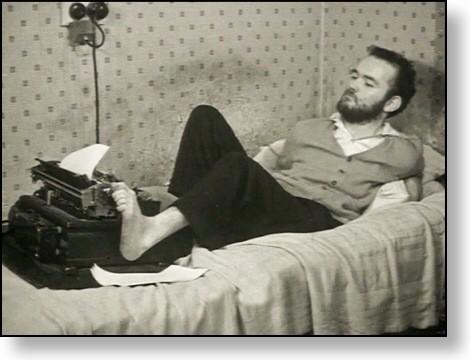
Irish author and artist Christy Brown was born in 1932 in Dublin, one of 22 children (13 of whom survived) belonging to a bricklayer and his wife.
Christy was not like his siblings. His body was ravaged by cerebral palsy.
As a child he could not speak. He exercised little control over his muscles. Most observers concluded there was nothing of significance happening inside his head. Only his mother believed he was capable of learning.
Christy did have one link to the outside world. He could fully command the movements of his left foot.
When about five years old he stunned his parents by picking up a piece of chalk with his foot and writing the letter “A” on the kitchen floor. Later he spelled out his first word: “Mother.”
It soon became clear that an extraordinary soul was imprisoned by an uncooperative body. By holding a paintbrush with his left foot, Christy became a noteworthy artist. He began to write.
His struggles to overcome his monumental physical obstacles were chronicled in his autobiography, My Left Foot, and became widely known through the 1989 movie of the same name. Daniel Day-Lewis won the Best Actor Academy Award for his portrayal of Christy, and Brenda Fricker the Best Supporting Actress Oscar for her role as Christy’s mother.
Despite his achievements, Christy’s world was largely one of darkness, bitterness, and despair. He yearned for a measure of normalcy. Could he ever experience a measure of self-sufficiency? Would he ever fall in love and be loved in return?
His hopes began to rise when, at the age of 17, he was interviewed by a group of therapists in London. They specialized in helping those afflicted by cerebral palsy.
His heart soared when he heard Mrs. Collis speak the words he had always wanted to hear: “Yes, you can be cured if you are prepared to do lots of hard work over the next few years. But…” Christy continues the story: “And here she paused, looking steadily at me, and went on: ‘You must first make a big sacrifice. Nothing good is ever obtained without one. And yours is…you must resolve never to use your left foot again.’
“My left foot? But that meant everything to me. I could speak only with that. Create only with that. It was my only means of communication with the outside world, my only means of reaching the minds of other people and making myself articulate and intelligible. The rest of me was useless, worthless. And that one limb, my left foot, was the only workable limb in my whole body. Without it I would be lost. Silent. Powerless.”
Mrs. Collis explained that Christy would never walk, talk, or use his hands in a more normal manner unless he abandoned his dependence on his left foot. He might one day be free to use it again – but not until its power over him was broken. Everything else in his body was crippled, so to speak, because of his overwhelming focus on the one part of his body that worked.
Brown writes: “I must pay a big price, perhaps even a cruel price, to win a bigger gain. ‘I will,’ I said to Mrs. Collis. She took my hand and pressed it. ‘Good boy. It’s not going to be easy… [but] the first step has been taken…’”
In his Sermon on the Mount, Jesus says something equally stunning. And frightening. “If your right hand causes you to sin, cut if off and throw it away. It is better for you to lose one part of your body than for your whole body to go into hell.” (Matthew 5:30)
Bible scholars agree that this is Middle Eastern hyperbole – a dramatic exaggeration. Jesus is not counseling literal self-mutilation.
But he’s also not saying something trivial. Real life requires supreme sacrifice. If there is anything that is preventing us from being God’s person, it has to go. Now.
It’s easy to comprehend that the “bad” parts of our lives must be cut off. We need to walk away from the addiction. The relationship that’s been wrong from the start. That sin we’ve never revealed to anybody.
But Jesus unhesitatingly puts “good” things on the chopping block as well. So often the good becomes the enemy of the best. We’re called to step back from the habits and the hobbies that seem quite innocent – except that they’re devouring all of the time and energy we might be giving to others. Our career, our stuff, and our family relationships – all good things – cannot occupy the center stage that is reserved for God alone.
It’s not easy to demote them. How can we ever live without favoring our left foot?
God will show us how.
The first step is to boldly say what Christy Brown said: “I will.” What Christy ultimately gained was a freedom he could only dream about before.
With God’s help, that can be our story, too.
